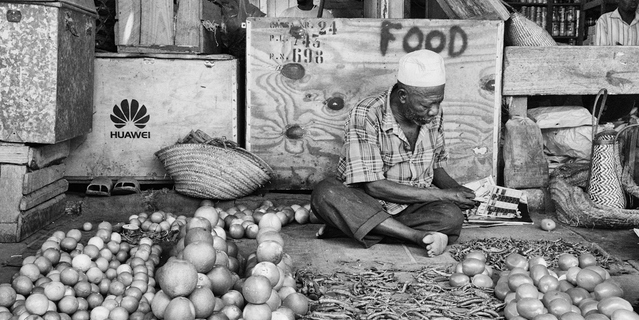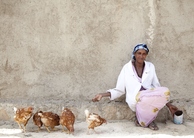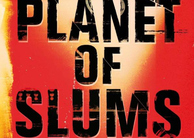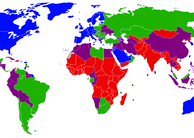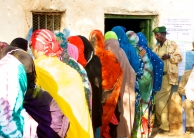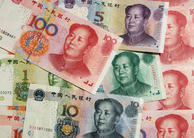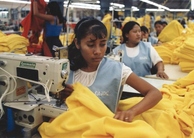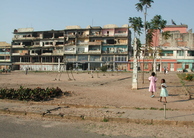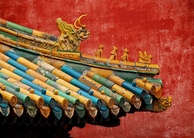|
International Development (tagged articles)
The keyword International Development is tagged in the following 31 articles.
2022, Vol. 14 No. 01
This article explores the political relationship between nation-building, ethnicity, and democracy in the context of Ethiopia. It traces Ethiopia's poltical history, explores the consequential role ethnicity has played in the formation of the modern... Read Article »
2020, Vol. 12 No. 09
The necessity of international relief is unending as new crises continue to emerge across the world. International aid plays a crucial role in shaping how affected communities rebuild after a crisis. However, humanitarian aid often results in a... Read Article »
2017, Vol. 9 No. 02
Following the failure of Structural Adjustment Programmes (SAPs) in the 1980s, and the liberal triumphalism caused by the end of the Cold War, development discourse underwent a significant transformation. Key to the new development paradigm was... Read Article »
2016, Vol. 8 No. 09
Grameen Bank, translated as "rural bank" in the Bangla language, is a grassroots microcredit organization founded in 1983 by Bangladeshi economist Muhammad Yunus to provide new financial opportunities to the poor. Grameen Bank and Muhammad Yunus... Read Article »
2016, Vol. 8 No. 06
Although education is at the forefront of innumerable research and development initiatives, some countries remain significantly under-researched. While increasing statistics exist on development indicators and education in The Lao PDR (hereafter... Read Article »
2016, Vol. 8 No. 06
Despite being often overlooked within the discipline of International Relations (Lee, 2004: 29; Bambra et al., 2005: 187), the governance of health has become central to international politics. As recent spatial, temporal and cognitive transformations... Read Article »
2016, Vol. 8 No. 06
In their search for a new development paradigm, many African governments and international organizations have reverted to cooperatives, a distinct business model that manifest a turbulent history ranging from pre-colonial to colonial and post-independence... Read Article »
2015, Vol. 2 No. 1
This paper seeks to address one of the most common critiques of Asian firms doing business in Africa: that low levels of corporate governance and poor managerial practices have undermined anti-corruption efforts throughout the continent. The paper... Read Article »
2016, Vol. 8 No. 03
In 2014, the United Nations called for "a truly transformative agenda to follow the Millennium Development Goals." This study applies a critical qualitative discourse and textual analysis to examine the first priority of the agenda—to end... Read Article »
2016, Vol. 8 No. 03
Developing states with large natural resource industries have an inclination to become over-reliant on one source of capital, causing other industries to fail, promoting corruption, and stimulating crime. Nigeria is one such case, as their booming... Read Article »
2016, Vol. 8 No. 02
Planet of Slums by Mike Davis (2006) is a startling, terrifying, and honest exposé of the world’s poorest big-city slum dwellers. The book explores the future of an unstable and impoverished urban world, and provides a thematic overview... Read Article »
2015, Vol. 11 No. 1
In 2013, developing countries were expected to receive $414 billion in remittances – money sent back home by migrant workers. Remittances have been extolled in academic literature for having a substantial positive impact on development and... Read Article »
2014, Vol. 2014 No. 1
In spite of the long-standing debate among economists on the optimal level of government involvement in economic development, little has been said on an optimal level of involvement by non-governmental "Civil Society" Organizations (CSOs). In particular... Read Article »
2014, Vol. 2014 No. 1
On May 18th, 2000, the United States enacted the African Growth and Opportunity Act (AGOA), dramatically expanding trade between itself and Sub-Saharan Africa over the following decade. Yet whereas previous studies in the literature have often sought... Read Article »
2014, Vol. 6 No. 09
Up until the 19th century, China held a position as a great world power. However, for the last two hundred years the West has dominated the world technologically, economically, and politically. The point at which the West began its relative dominance... Read Article »
2014, Vol. 7 No. 2
Freeman writes that global governance in this period has been characterized by the United States’ inability to form a ‘grand strategy’ as it did in the post-WWII period to cope with the multitude of issues in the world today (2011... Read Article »
2014, Vol. 6 No. 03
The creation of western-style government institutions has been unsuccessful in Somalia. This is a direct result of colonial administrations not laying the proper foundation for western government institutions to achieve legitimacy in a culture of... Read Article »
2013, Vol. 4 No. 1
This study provides an overview of the International Development field's attention to urbanization. Despite cities being proven the largest hubs of development for the industrializing world, patterns in urban areas often behave much differently... Read Article »
2013, Vol. 5 No. 08
This report examines the Chinese economic model, the potential for future Chinese growth, and the implications for Australia. An examination of factors that have contributed to the rise of the modern Chinese economy including demographic factors... Read Article »
2011, Vol. 3 No. 09
Since the early 1990s, rampant piracy off the coast of Somalia has become a major issue for global trade and security, prompting strong responses from the international community. In 2010 alone, the collective cost of ransom money, military protection... Read Article »
2011, Vol. 3 No. 08
Development is closely linked to the idea of progress. Therefore the way in which progress is quantified, whether through economic, social or spiritual values, determines the way in which we conceptualize development (Power 2005). Religious beliefs... Read Article »
2011, Vol. 3 No. 03
It is widely recognized that state security is no longer contingent upon a balance of power or the threat of conquering states, but global stability is now instead jeopardized by weak or fragile states. Fragile states represent chaos, disorder,... Read Article »
2010, Vol. 2 No. 11
Learning to play guitar is painful. For the first months, the coarse steel of the guitar strings shreds the soft skin of the player’s fingertips into a disgusting bloody mess. A reasonable person who does not play guitar would be entirely... Read Article »
2010, Vol. 2 No. 09
A country of approximately 37 million people, Kenya has struggled to build a health system that can effectively deliver quality health services to its population. Access to health care varies widely throughout the country and is determined on numerous... Read Article »
2010, Vol. 2 No. 09
Postcolonial Kenya has seen a significant amount of development, both politically and economically, since its independence in 1963. Starting with the presidency of Jomo Kenyatta, the nation prospered -- experiencing economic growth of at least 5... Read Article »
2010, Vol. 2 No. 07
The United States presidency is a complex role, encompassing both domestic and foreign policy responsibilities. As a major world power, the United States has a large role in the realm of foreign policy, and it is the duty of the president to assume... Read Article »
2010, Vol. 3 No. 2
Colonel William Way is a USAR officer. He received a direct commission in the Army Judge Advocate General's Corps in 1990. Colonel Way earned a BS in Economics from the Wharton School, University of Pennsylvania, in 1983, a JD from Hastings College... Read Article »
2010, Vol. 2 No. 04
Angola today is framed by a history of violent conflict that has left the population far behind on all major indicators. Lacking a democratic culture, the country faces two significant challenges: first, the challenge of completing a long-stalled... Read Article »
2010, Vol. 2 No. 01
Since 1989, when economist John Williamson first conceived of the economic and policy recommendations known as the Washington Consensus (Williamson, 1989), this Consensus became generally accepted as the most effective model by which developing... Read Article »
1999, Vol. 1998/1999 No. 1
Imagine if your student loan determined every decision you made in your entire life… Imagine if you owed 30 times more than you could ever earn in a lifetime…. Difficult to imagine because if this situation happened in a developed... Read Article »
1997, Vol. 1996/1997 No. 2
A mother makes aprons and children’s clothes and sells them in a local market. She needs money to buy materials and thread. A rickshaw driver can increase his earnings with a small motorized rickshaw, but needs the money to buy it. A coffee... Read Article »
Expedited Article Review
Submit an article and get a decision fast.
If you need a fast decision, INQUIRIES Journal offers expedited processing of your submission for a small fee. Depending on the expedited review option you choose, you can receive a decision in as few as 5-days.
In addition to a shorter review period, the fee supports the journal's continued operation and open-access publishing model. Standard submissions are always free. Submit Now » - Submit an Article to Inquiries Journal -
|



